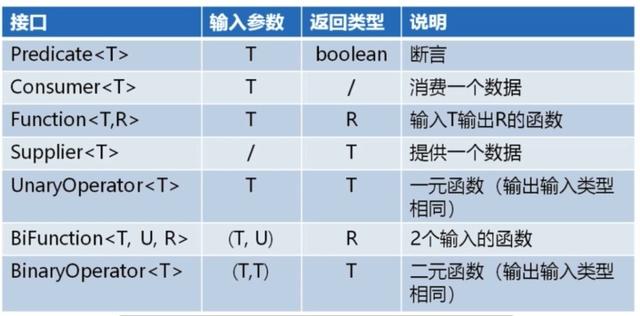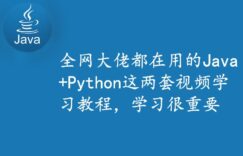
从我们自定义的IHello示例来看,Lambda表达式其实是一种接口类型的数据类型,严格的说Lambda表达式的数据类型是:函数式接口,是一种特殊的接口,该接口使用@FunctionalInterface注解来标记(不是必须的,可以不用该注解标记,IHello接口就没有使用该注解标记, ),并且接口中只能有一个抽象方法,可以有多个静态方法或者默认方法, 每一个该类型的lambda表达式都会被匹配到这个抽象方法。
@FunctionalInterface
public interface Comparator<T> {
int compare(T o1, T o2);
// 其它 static 、default方法
}
@FunctionalInterface: 该注解没啥太大含义,该注解是给编译器做检查使用的,如果使用了该注解,编译器就会检查该接口中的抽象方法是不是只有一个,如果有多个就会报错:在接口Xxx中找到多个非覆盖抽象方法
@Documented
@Retention(RetentionPolicy.RUNTIME)
@Target(ElementType.TYPE)
public @interface FunctionalInterface {}
我们完善一下我们的IHello, 使用@FunctionalInterface注解
@FunctionalInterface
public interface IHello {
void sayHello(String name);
}
我们可以将lambda表达式当作任意只包含一个抽象方法的接口类型,也就是说我们的IHello接口无论叫什么名字,接口中的方法无论叫什么名字都无所谓(只是可读性更好些),因此可以再进行抽象化一下,JDK1.8中提供了这样的函数式接口,我们也不需要再定义IHello接口了,JDK1.8中提供了Supplier、 Consumer 、 Function 、BiFunction,这几个是比较常用的
Supplier< T > 供应商:没有参数,有返回值
@FunctionalInterface
public interface Supplier<T> {
T get();
}
Consumer< T > 消费者: 只有一个参数,没有返回值
@FunctionalInterface
public interface Consumer<T> {
void accept(T t);
}
Function< T, R > 函数:一个参数,一个返回值
@FunctionalInterface
public interface Function<T, R> {
R apply(T t);
}
BiFunction< T, U, R > 二元函数:两个参数,一个返回值
@FunctionalInterface
public interface BiFunction<T, U, R> {
R apply(T t, U u);
}
Comparator< T > 比较器:接收两个参数,返回比较的结果
@FunctionalInterface
public interface Comparator<T> {
int compare(T o1, T o2);
}
使用以上四大函数式接口来取代自定义的接口IHello
public class Main {
private static String end = ".";
public static void main(String[] args) {
// 直接使用JDK1.8提供的接口,不需要再定义IHello接口, 直接使用JDK提供的接口来接收Lambda表达式
Supplier<String> supplier = () -> "mengday: happy new year everyone!";
String result = supplier.get();
System.out.println(result);
Consumer<String> consumer = (name) -> System.out.println(name + ": " + "happy new year everyone!");
consumer.accept("mengday");
Function<String, String> func = (name) -> name + ": " + "happy new year everyone!";
String hi = func.apply("mengday");
System.out.println(hi);
// 在代码块的内部可以访问静态全局变量
// 在代码块中可以访问外边局部变量
// 在代码块的内部可以修改全局静态变量
// 在代码块内部是不能访问接口中的其它方法的
String split = ": ";
BiFunction<String, String, String> biFunction = (String name, String msg) -> {
end = "!";
String hello = name + split + msg + end;
return hello;
};
String hello = biFunction.apply("mengday", "happy new year everyone");
System.out.println(hello);
// 根据字符串长度比较大小
Comparator<String> comparator = (s1, s2) -> s1.length() - s2.length();
int compare = comparator.compare("abc", "ab");
System.out.println(compare);
}
}
Predicate< T > 断言 谓词 : 用于测试一个条件的真假
package java.util.function;
import java.util. Object s;
@FunctionalInterface
public interface Predicate<T> {
// 在给定的参数上评估这个谓词
boolean test(T t);
// 返回一个组合的谓词,表示该谓词与另一个谓词的短路逻辑AND
default Predicate<T> and(Predicate<? super T> other) {
Objects.requireNonNull(other);
return (t) -> test(t) && other.test(t);
}
// 返回表示此谓词的逻辑否定的谓词,相当于not
default Predicate<T> negate() {
return (t) -> !test(t);
}
// 返回一个组合的谓词,表示该谓词与另一个谓词的短路逻辑或
default Predicate<T> or(Predicate<? super T> other) {
Objects.requireNonNull(other);
return (t) -> test(t) || other.test(t);
}
// 返回根据 Objects.equals(Object, Object)测试两个参数是否相等的谓词
static <T> Predicate<T> isEqual(Object targetRef) {
return (null == targetRef) ? Objects::isNull : object -> targetRef.equals(object);
}
}
Main
public static void main(String[] args) {
// 可以构造复杂的条件: 并且and、或者or、否negate
String email = "mengday@gmal.com";
Predicate<String> predicate = (str) -> str.length() > 20;
// 测试 emial.length > 0 的boolean
boolean result = predicate.test(email); // false
// 测试 !(emial.length > 0) 的boolean
result = predicate.negate().test(email); // true
Predicate<String> orPredicate = (str) -> str.contains("@");
// 测试 emial.length > 0 or emial.contains("@")
result = predicate.or(orPredicate).test(email); // true
} 

